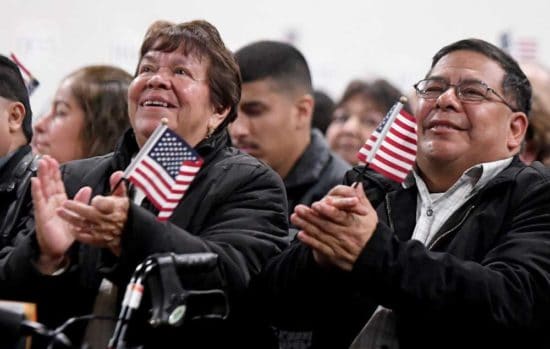Vòt nan Etazini
Etazini se yon demokrasi. Sitwayen yo ka vote pou deside ki moun ki gouvène yo epi pran desizyon sou non yo. Vòt ba ou yon di nan ki moun ki pral reprezante ou nan kominote lokal ou a, eta, ak gouvènman nasyonal la.
Lalwa pa egzije w pou w vote men li konsidere kòm yon devwa sivik. Vote se yon pati enpòtan nan lavi yon sitwayente Ameriken. Li se yon opòtinite yo pataje opinyon w epi fè yon diferans nan kominote w la. Ou ka ede chwazi reprezantan ki defann kòz ou kwè landan yo e ke w bay enpòtans.
(https://www.youtube.com/watch?v=JAI9vuvCads)
Vwa ou enpòtan
Kòm yon imigran, vwa ou ka tande epi ou ka fè yon pati nan demokrasi. Vote se yon rezon enpòtan pou vin yon sitwayen. Lè ou vote, ou ka chwazi kandida ki aliyen ak valè ou, kilti, ak opinyon.
2024 se yon ane eleksyon enpòtan Nan mwa Novanm nan, elektè yo chwazi yon prezidan pou 4 lane k ap vini yo. Sitwayen ki natiralize yo reprezante 10% nan tout elektè ki elijib yo nan Etazini. Plis pase 3.5 milyon imigran ka vote pou premye fwa ane sa a. Ou menm tou, ou kapab fè yo tande vwa w. Jwenn enfòmasyon sou New American Voters.
(https://www.youtube.com/watch?v=wt3kQNCUZQ0&t)
Ki moun ki ka vote
Ou dwe yon sitwayen Ameriken epi gen 18 lane pou w kapab vote nan eleksyon nasyonal yo. Ou menm tou ou dwe anrejistre pou vote nan eta ou (sof si ou ap viv nan North Dakota). Aprann plis sou règleman espesifik leta yo.
Kèk vil pèmèt moun ki pa sitwayen yo vote nan eleksyon lokal yo. Li enpòtan pou tcheke anvan ou enskri. Moun ki bay manti pou kapab vote ka fè fas a konsekans grav, ki gen ladan arestasyon e menm depòtasyon.
Tou depan de eta ou, kèk moun yo te kondane de yon krim ka pa kapab vote.
| Kondisyon pou vote ak opsyon yo varye pa eta a. Ou ka gade moute enfòmasyon leta ou sou VOTE411. |
Enskri pou vote
Enskri pou vote vle di mete non w sou lis votè yo nan kominote w la. Li sèlman pran 2 minit. Ou pral ranpli yon fòm ak kèk enfòmasyon pèsonèl debaz. Dat limit pou enskri varye pa eta.
Ou ka enskri tou an pèsòn nan biwo elektoral lokal ou a oswa pa kourye lapòs. Mete sou sa, ou ka enskri pou w vote lè w ap resevwa yon pèmi pou kondi oswa yon asistans piblik. Ou ka verifye si ou enskri deja.
Ou pral jwenn yon kat enskripsyon elektè nan lapòs la ki konfime ke w anrejistre pou vote. Li ka pran plizyè semèn pou rive.
Si ou demenaje, ou dwe mete enskripsyon elektoral ou an ajou avèk nouvo adrès ou an. Si ou demenaje ale nan yon lòt eta, ou dwe enskri ankò pou w vote nan nouvo eta ou a.
Deside vòt ou
Anvan w vote, w ap vle aprann plis sou chwa w yo. Ou ka vote pou kandida, pwoblèm, oswa pozisyon ou pa te tande sou yo. Men kèk fason ou ka jwenn enfòmasyon:
- Chache gid enfòmasyon sou elektè sou sit entènèt leta ou an.
- Konsilte sit entènèt kandida yo pou w konnen pozisyon yo sou diferan kesyon.
- Mande zanmi, fanmi, ak manm kominote de konfyans.
- Asiste nan reyinyon sal vil lokal yo ak deba kominotè yo.
- Konsilte sijestyon vot oganizasyon yo ki sipòte dwa ki enpòtan pou ou yo.
- Li epi gade nouvèl ou de konfyans pou aprann sou kandida yo epi tande yo pale oswa deba. Pa egzanp, atik NBC sa a eksplike ki kote kandida prezidansyèl yo kanpe sou kesyon kle yo.
Jeneralman piblisite politik yo ak rezo sosyal yo pa reprezante bon chwa pou w jwenn enfòmasyon ki ekilibre oswa opinyon ki fyab.
Kòman pou vote
Gen kèk fason diferan pou vote Etazini, tou depann de eta a w ap viv lan ak opsyon yo ofri yo. Ou kapab swa:
- Vote pa korespondans
- Vote pa kourye lapòs
- Vote bonè an pèsòn
- Vote nan jou eleksyon a, an pèsòn
Vòt pa bilten absenti
Si w konnen ou pa pral kapab vote an pèson, ou ka mande yon bilten bilten absente. Yon bilten vòt absenti yo rele tou yon bilten bilten lapòt-an paske ou ranpli vòt ou soti nan kay la epi lapòs li nan.
Ou pa bezwen bay yon rezon pou w ka resevwa yon bilten vòt pa korespondans nan 28 eta. Sepandan, gen yon pòsyon eta ki egzije pou w founi sèten rezon pou w mande youn. Si ou se yon sitwayen ameriken ki nan peyi etranje, ou ka toujou mande yon bilten vòt.
Vote pa lapòs
Si w ap viv nan California, Colorado, D.C. (Distri Columbia), Hawaii, Nevada, Oregon, Utah, Vermont, oswa Washington, ou pa bezwen mande yon bilten vòt pa korespondans pou w vote lakay ou. Eta sa yo òganize eleksyon pa korespondans olye an pèsòn. Yo gen pou yo voye bilten vòt ou an otomatikman ba ou pa lapòs.
Vòt bonè an pèsòn
Nan anpil eta, ou kapab vote tou anvan jou eleksyon gras ak vòt antisipe an peson lan. Verifye opsyon vòt bonè eta ou a pou wè kilè ak ki kote ou ka vote byen bonè.
Vòt sou jou eleksyon an pèsòn
Kote w vote a rele biwo de vòt oswa lye de vòt Estasyon biwo vòt yo anjeneral sitiye nan enstalasyon piblik tankou lekòl oswa legliz nan katye w. Jwenn biwo vòt lokalou a. Gen kèk eta ki itilize sant vòt yo, ki se pi gwo enstalasyon kote ou ka vote si w ap viv nan konte la.
Nan estasyon biwo vòt ou a, yon volontè ap mande w pou non ou ak pètèt pou idantifikasyon. Règleman idantifikasyon varye pa eta. Gen kèk estasyon biwo vòt ki ka mande lisans chofè w, paspò, oswa bòdwo sèvis piblik. Ou pa bezwen pote kat enskripsyon votè ou pou vote men li ka itil.
Benevòl la gen pou l montre w ki izolwa ou ka itilize. Yon izolwa vòt se yon ti espas/kabin. Li pèmèt ou genyen entimite pandan w ap vote.
Konnen dwa ou
Si w se yon moun ki gen yon andikap, Lwa Ameriken ki gen andikap mande pou estasyon biwo vòt asire ke ou ka jwenn aksè epi sèvi ak enstalasyon yo.
Si ou pa ka pale oswa li anglè byen, ou ka mennen yon moun ak ou pou li ede w vote. Nan kèk konte, ou ka anmezi pou w jwenn yon bilten vòt nan lang ou an.
Si yo pa ka jwenn non ou, ou ka mande yon bilten vòt pwovizwa.
Si biwo vòt la fèmen pandan w toujou nan liy, ou gen dwa pou w rete epi vote.
Si yon moun ap entimide oswa menase ou, konnen ke li ilegal epi yo ta dwe rapòte.
Si w gen nenpòt pwoblèm nan jou eleksyon, ou ka rele yon liy dirèk pwoteksyon eleksyon:
- Anglè: 1-866-OUR-VOTE (866-687-8683)
- Panyòl: 1-888-VE-Y-VOTA (888-839-8682)
- Azyatik plizyè lang: 1-888-API-VOTE (888-274-8683)
- Arab: 1-844-YALLA-US (844-925-5287)
Aprann plis sou dwa votè yo.
Patisipe
Ede lòt moun nan kominote w la enskri pou vote se yon bon fason pou patisipe menm si ou pa kapab vote. Li se tou yon fason yo konekte ak nouvo moun. Ou ka chèche opòtinite ak òganizasyon, tankou:
- ACLU
- APIAVote
- League of Women Voters
- Movement Voter Project list
- NALEO
- NPNA New American Voters
- Rock The Vote
- Voto Latino
- When We All Vote
Ou kapab tou sèvi kòm volontè tou w travay nan biwo vòt yo.
Tip eleksyon yo
Primè yo
Yon primè se yon konpetisyon nan ki pati politik chwazi kandida yo pou pwochen eleksyon jeneral la. Kandida a genyen kouri nan eleksyon jeneral la kont kandida a genyen soti nan lòt pati politik yo.
Nan USA a, de pi gwo pati politik yo se Pati Demokratik la ak Pati Repibliken an.
(https://www.youtube.com/watch?v=IOSCf2mBI3s)
Eleksyon jeneral yo
Eleksyon jeneral yo ap fèt nan mwa novanm. Votè yo chwazi ant gayan eleksyon prensipal la pou lokal, eta, ak ofisyèl federal yo.
- Eleksyon prezidansyèl yo fèt chak kat ane. Pwochen eleksyon prezidansyèl la se nan jounen madi 5 novanm 2024 la.
- Eleksyon Kongrè a rive chak de ane. Votè yo chwazi senatè ak manm Chanm Depite yo.
- Eleksyon Midterm yo se eleksyon kongrè a ant eleksyon prezidansyèl yo.
Eleksyon lokal
Eleksyon lokal yo se lè votè yo chwazi manm konsèy, jij, majistra, ak lòt ofisyèl lokal yo. Chak rejyon nan yon eta gen diferan dat pou eleksyon lokal yo. Jwenn enfòmasyon sou elèksyon eta w la ak enfòmasyon sou elèksyon lokal ou.
Eleksyon espesyal yo
Eleksyon espesyal yo rive lè yon evènman inatandi kreye yon bezwen pou yon nouvo moun nan yon pozisyon eli. Pa egzanp, gen yon eleksyon espesyal si yon moun mouri, demisyone, oswa retire nan biwo a.
Rezilta elèksyon yo
Ou ka jwenn dènye rezilta eleksyon yo sou sit entènèt eta ou oswa sit entènèt biwo lokal ou a. Gwo plòg nouvèl yo pral bay tou dènye ak kraze nan rezilta eleksyon yo.
Enfòmasyon ki nan paj sa a vini de USA.gov, vote.org, ACLU, ak lòt sous nou ka fè konfyans. Objektif nou se pou ofri enfòmasyon ki fasil pou konprann epi yo mete yo ajou regilyèman. Enfòmasyon sa yo pa konsèy jiridik.


